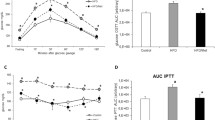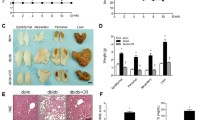Abstract
Obesity is associated with altered glycine metabolism in humans. This study investigated the mechanisms regulating glycine metabolism in obese rats. Eight-week-old Zucker diabetic fatty rats (ZDF; a type-II diabetic animal model) received either 1% glycine or 1.19% l-alanine (isonitrogenous control) in drinking water for 6 weeks. An additional group of lean Zucker rats also received 1.19% l-alanine as a lean control. Glycine concentrations in serum and liver were markedly lower in obese versus lean rats. Enteral glycine supplementation restored both serum and hepatic glycine levels, while reducing mesenteric and internal white fat mass compared with alanine-treated ZDF rats. Blood glucose and non-esterified fatty acid (NEFA) concentrations did not differ between the control and glycine-supplemented ZDF rats (P > 0.10). Both mRNA and protein expression of aminomethyltransferase (AMT) and glycine dehydrogenase, decarboxylating (GLDC) were increased in the livers of obese versus lean rats (P < 0.05). In contrast, glycine cleavage system H (GCSH) hepatic mRNA expression was downregulated in obese versus lean rats, although there was no change in protein expression. These findings indicate that reduced quantities of glycine observed in obese subjects likely results from an upregulation of the hepatic glycine cleavage system and that dietary glycine supplementation potentially reduces obesity in ZDF rats.

Similar content being viewed by others
Abbreviations
- ADMA:
-
Asymmetric dimethylarginine
- AGXT:
-
Alanine-glyoxylate aminotransferase
- AMT:
-
Aminomethyltransferase
- DAO:
-
d-amino-acid oxidase
- DLD:
-
Dihydrolipoamide dehydrogenase
- DMGDH:
-
Dimethylglycine dehydrogenase
- EDL:
-
Extensor digitorum longus muscle
- GCAT:
-
Glycine C-acetyltransferase
- GCSH:
-
Glycine cleavage system H
- GLDC:
-
Glycine dehydrogenase (decarboxylating)
- IL:
-
Interleukin
- NEFA:
-
Non-esterified fatty acid
- SARDH:
-
Sarcosine dehydrogenase
- SHMT:
-
Serine hydroxymethyltrasnferase 1
- THA1P:
-
Threonine aldolase 1 pseudogene
- TNF:
-
Tumor necrosis factor
- ZDF:
-
Zucker diabetic fatty
References
Alarcon-Aguilar FJ, Almanza-Perez J, Blancas G, Angeles S, Garcia-Macedo R, Roman R, Cruz M (2008) Glycine regulates the production of pro-inflammatory cytokines in lean and monosodium glutamate-obese mice. Eur J Pharmacol 599:152–158. https://doi.org/10.1016/j.ejphar.2008.09.047
Almanza-Perez JC, Alarcon-Aguilar FJ, Blancas-Flores G, Campos-Sepulveda AE, Roman-Ramos R, Garcia-Macedo R, Cruz M (2009) Glycine regulates inflammatory markers modifying the energetic balance through PPAR and UCP-2. Biomed Pharmacother. https://doi.org/10.1016/j.biopha.2009.04.047
Atanassova SS, Panchev P, Ivanova M (2010) Plasma levels and urinary excretion of amino acids by subjects with renal calculi. Amino Acids 38:1277–1282. https://doi.org/10.1007/s00726-009-0359-z
Blancas-Flores G et al (2012) Glycine suppresses TNF-alpha-induced activation of NF-kappaB in differentiated 3T3-L1 adipocytes. Eur J Pharmacol 689:270–277. https://doi.org/10.1016/j.ejphar.2012.06.025
Brawley L et al (2004) Glycine rectifies vascular dysfunction induced by dietary protein imbalance during pregnancy. J Physiol 554:497–504. https://doi.org/10.1113/jphysiol.2003.052068
Carvajal Sandoval G, Medina Santillan R, Juarez E, RamosMartinez G, Carvajal Juarez ME (1999) Effect of glycine on hemoglobin glycation in diabetic patients. Proc West Pharmacol Soc 42:31–32
CDC (2017) CDC Overweight & Obesity. Accessed February 10 2020
Cochrane WA, Payne WW, Simpkiss MJ, Woolf LI (1956) Familial hypoglycemia precipitated by amino acids. J Clin Invest 35:411–422. https://doi.org/10.1172/JCI103292
Coe FL, Evan A, Worcester E (2005) Kidney stone disease. J Clin Invest 115:2598–2608. https://doi.org/10.1172/JCI26662
Davis JS, Anstey NM (2011) Is plasma arginine concentration decreased in patients with sepsis? A systematic review and meta-analysis. Crit Care Med 39:380–385. https://doi.org/10.1097/CCM.0b013e3181ffd9f7
El Hafidi M, Perez I, Zamora J, Soto V, Carvajal-Sandoval G, Banos G (2004) Glycine intake decreases plasma free fatty acids, adipose cell size, and blood pressure in sucrose-fed rats. Am J Physiol Regul Integr Comp Physiol 287:R1387-1393. https://doi.org/10.1152/ajpregu.00159.2004
El Hafidi M, Perez I, Banos G (2006) Is glycine effective against elevated blood pressure? Curr Opin Clin Nutr Metab Care 9:26–31
Ewart HS, Jois M, Brosnan JT (1992) Rapid stimulation of the hepatic glycine-cleavage system in rats fed on a single high-protein meal. Biochem J 283(Pt 2):441–447. https://doi.org/10.1042/bj2830441
Felig P, Marliss E, Cahill GF Jr (1969) Plasma amino acid levels and insulin secretion in obesity. N Engl J Med 281:811–816
Flegal KM, Carroll MD, Ogden CL, Curtin LR (2010) Prevalence and trends in obesity among US adults, 1999–2008. JAMA 303:235–241. https://doi.org/10.1001/jama.2009.2014
Flynn NE, Meininger CJ, Haynes TE, Wu G (2002) The metabolic basis of arginine nutrition and pharmacotherapy. Biomed Pharmacother 56:427–438
Fu WJ et al (2005) Dietary l-arginine supplementation reduces fat mass in Zucker diabetic fatty rats. J Nutr 135:714–721. https://doi.org/10.1093/jn/135.4.714
Garcia-Macedo R, Sanchez-Munoz F, Almanza-Perez JC, Duran-Reyes G, Alarcon-Aguilar F, Cruz M (2008) Glycine increases mRNA adiponectin and diminishes pro-inflammatory adipokines expression in 3T3-L1 cells. Eur J Pharmacol 587:317–321. https://doi.org/10.1016/j.ejphar.2008.03.051
Gomez-Zamudio JH, Garcia-Macedo R, Lazaro-Suarez M, Ibarra-Barajas M, Kumate J, Cruz M (2015) Vascular endothelial function is improved by oral glycine treatment in aged rats. Can J Physiol Pharmacol 93:465–473. https://doi.org/10.1139/cjpp-2014-0393
Hampson RK, Barron LL, Olson MS (1984) Stimulation of the glycine cleavage system by short-chain fatty acids in isolated rat liver mitochondria. Biochemistry 23:4604–4610. https://doi.org/10.1021/bi00315a014
Ikejima K, Iimuro Y, Forman DT, Thurman RG (1996) A diet containing glycine improves survival in endotoxin shock in the rat. Am J Physiol 271:G97-103
Jois M, Hall B, Brosnan JT (1990) Stimulation of glycine catabolism in isolated perfused rat liver by calcium mobilizing hormones and in isolated rat liver mitochondria by submicromolar concentrations of calcium. J Biol Chem 265:1246–1248
Kikuchi G (1973) The glycine cleavage system: composition, reaction mechanism, and physiological significance. Mol Cell Biochem 1:169–187
Kikuchi G, Motokawa Y, Yoshida T, Hiraga K (2008) Glycine cleavage system: reaction mechanism, physiological significance, and hyperglycinemia. Proc Jpn Acad Ser B Phys Biol Sci 84:246–263. https://doi.org/10.2183/pjab.84.246
Kim S, Choi Y, Bazer FW, Spencer TE (2003) Identification of genes in the ovine endometrium regulated by interferon tau independent of signal transducer and activator of transcription 1. Endocrinology 144:5203–5214
Kim JY, Burghardt RC, Wu G, Johnson GA, Spencer TE, Bazer FW (2011) Select nutrients in the ovine uterine lumen. VII. Effects of arginine, leucine, glutamine, and glucose on trophectoderm cell signaling, proliferation, and migration. Biol Reprod 84:62–69. https://doi.org/10.1095/biolreprod.110.085738
Kohli R, Meininger CJ, Haynes TE, Yan W, Self JT, Wu G (2004) Dietary l-arginine supplementation enhances endothelial nitric oxide synthesis in streptozotocin-induced diabetic rats. J Nutr 134:600–608
Kopple JD (2010) Obesity and chronic kidney disease. J Ren Nutr 20:S29-30. https://doi.org/10.1053/j.jrn.2010.05.008
Kure S (2011) Two novel laboratory tests facilitating diagnosis of glycine encephalopathy (nonketotic hyperglycinemia) Brain & Development in press
Leiper J et al (2007) Disruption of methylarginine metabolism impairs vascular homeostasis. Nat Med 13:198–203. https://doi.org/10.1038/nm1543
Lewis RM, Godfrey KM, Jackson AA, Cameron IT, Hanson MA (2005) Low serine hydroxymethyltransferase activity in the human placenta has important implications for fetal glycine supply. J Clin Endocrinol Metab 90:1594–1598. https://doi.org/10.1210/jc.2004-0317
Mardinoglu A, Agren R, Kampf C, Asplund A, Uhlen M, Nielsen J (2014) Genome-scale metabolic modelling of hepatocytes reveals serine deficiency in patients with non-alcoholic fatty liver disease. Nat Commun 5:3083. https://doi.org/10.1038/ncomms4083
Mondello S et al (2010) Glutamine-supplemented total parenteral nutrition improves immunological status in anorectic patients. Nutrition 26:677–681. https://doi.org/10.1016/j.nut.2009.10.008
Naoi M, Yagi K (1976) Oxidation of sarcosine and N-alkyl derivatives of glycine by d-amino-acid oxidase. Biochim Biophys Acta 438:61–70
Narkewicz MR, Moores RR Jr, Battaglia FC, Frerman FF (1999) Ontogeny of serine hydroxymethyltransferase isoenzymes in fetal sheep liver, kidney, and placenta. Mol Genet Metab 68:473–480. https://doi.org/10.1006/mgme.1999.2932
Neuberger A (1981) The metabolism of glycine and serine. Compr Biochem 19A:257–303
Nguyen D, Samson SL, Reddy VT, Gonzalez EV, Sekhar RV (2013) Impaired mitochondrial fatty acid oxidation and insulin resistance in aging: novel protective role of glutathione. Aging Cell 12:415–425. https://doi.org/10.1111/acel.12073
Nyhan WL (1982) Metabolism of glycine in the normal individual and in patients with non-ketotic hyperglycinaemia. J Inherit Metab Dis:105–110
Palmnas MSA et al (2018) Serum Metabolomics of activity energy expenditure and its relation to metabolic syndrome and obesity. Sci Rep 8:3308. https://doi.org/10.1038/s41598-018-21585-6
Pi-Sunyer X (2003) A clinical view of the obesity problem. Science 299:859–860. https://doi.org/10.1126/science.1082319
Rodionov RN, Murry DJ, Vaulman SF, Stevens JW, Lentz SR (2010) Human alanine-glyoxylate aminotransferase 2 lowers asymmetric dimethylarginine and protects from inhibition of nitric oxide production. J Biol Chem 285:5385–5391. https://doi.org/10.1074/jbc.M109.091280
Rose ML, Madren J, Bunzendahl H, Thurman RG (1999) Dietary glycine inhibits the growth of B16 melanoma tumors in mice. Carcinogenesis 20:793–798
Sakata Y et al (2001) Structure and expression of the glycine cleavage system in rat central nervous system. Brain Res Mol Brain Res 94:119–130. https://doi.org/10.1016/s0169-328x(01)00225-x
Salido EC et al (2006) Alanine-glyoxylate aminotransferase-deficient mice, a model for primary hyperoxaluria that responds to adenoviral gene transfer. Proc Natl Academy Sci U S A 103:18249–18254. https://doi.org/10.1073/pnas.0607218103
Satterfield MC, Hayashi K, Song G, Black SG, Bazer FW, Spencer TE (2008) Progesterone regulates FGF10, MET, IGFBP1, and IGFBP3 in the endometrium of the ovine uterus. Biol Reprod 79:1226–1236. https://doi.org/10.1095/biolreprod.108.071787
Semins MJ, Shore AD, Makary MA, Magnuson T, Johns R, Matlaga BR (2010) The association of increasing body mass index and kidney stone disease. J Urol 183:571–575. https://doi.org/10.1016/j.juro.2009.09.085
Spencer TE, Bartol FF, Bazer FW, Johnson GA, Joyce MM (1999) Identification and characterization of glycosylation-dependent cell adhesion molecule 1-like protein expression in the ovine uterus. Biol Reprod 60:241–250
Stewart MD et al (2000) Prolactin receptor and uterine milk protein expression in the ovine endometrium during the estrous cycle and pregnancy. Biol Reprod 62:1779–1789
Thompson JS, Richardson KE (1967) Isolation and characterization of an l-alanine: glyoxylate aminotransferase from human liver. J Biol Chem 242:3614–3619
Thompson HR, Jones GM, Narkewicz MR (2001) Ontogeny of hepatic enzymes involved in serine- and folate-dependent one-carbon metabolism in rabbits. Am J Physiol Gastrointest Liver Physiol 280:G873-878
Vallance P, Leiper J (2004) Cardiovascular biology of the asymmetric dimethylarginine:dimethylarginine dimethylaminohydrolase pathway. Arterioscler Thromb Vasc Biol 24:1023–1030. https://doi.org/10.1161/01.ATV.0000128897.54893.26
Wheeler MD et al (1999) Glycine: a new anti-inflammatory immunonutrient. Cell Mol Life Sci 56:843–856
WHO (2016) Obesity Statistics. Accessed February 10 2020
Wijekoon EP, Skinner C, Brosnan ME, Brosnan JT (2004) Amino acid metabolism in the Zucker diabetic fatty rat: effects of insulin resistance and of type 2 diabetes. Can J Physiol Pharmacol 82:506–514. https://doi.org/10.1139/y04-067
Worcester EM, Coe FL (2010) Clinical practice Calcium kidney stones. N Engl J Med 363:954–963. https://doi.org/10.1056/NEJMcp1001011
Wu G (1995) Nitric oxide synthesis and the effect of aminoguanidine and NG-monomethyl-l-arginine on the onset of diabetes in the spontaneously diabetic BB rat. Diabetes 44:360–364
Xu TL, Gong N (2010) Glycine and glycine receptor signaling in hippocampal neurons: diversity, function and regulation. Prog Neurobiol 91:349–361. https://doi.org/10.1016/j.pneurobio.2010.04.008
Yin M et al (1998) Glycine accelerates recovery from alcohol-induced liver injury. J Pharmacol Exp Ther 286:1014–1019
Acknowledgements
This project was supported by an award from the Mexican and U.S. Latin American Research Center at Texas A&M University (M.C.S.) and by a Grant No. 10GRNT4480020 from American Heart Association (G.W.).
Author information
Authors and Affiliations
Corresponding author
Ethics declarations
Conflict of interest
The authors declare that they have no conflict of interest.
Research involving human participants and/or animals
All procedures performed in studies involving animals were approved by and in accordance with the ethical standards of the Institutional Animal Care and Use Committee at Texas A&M University.
Informed consent
No human participants were involved in this study.
Additional information
Handling editor: E. Closs.
Publisher's Note
Springer Nature remains neutral with regard to jurisdictional claims in published maps and institutional affiliations.
Rights and permissions
About this article
Cite this article
Simmons, R.M., McKnight, S.M., Edwards, A.K. et al. Obesity increases hepatic glycine dehydrogenase and aminomethyltransferase expression while dietary glycine supplementation reduces white adipose tissue in Zucker diabetic fatty rats. Amino Acids 52, 1413–1423 (2020). https://doi.org/10.1007/s00726-020-02901-9
Received:
Accepted:
Published:
Issue Date:
DOI: https://doi.org/10.1007/s00726-020-02901-9




